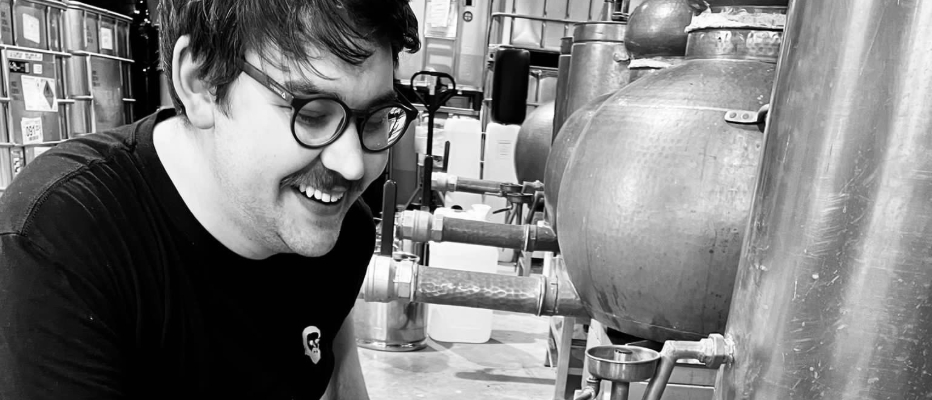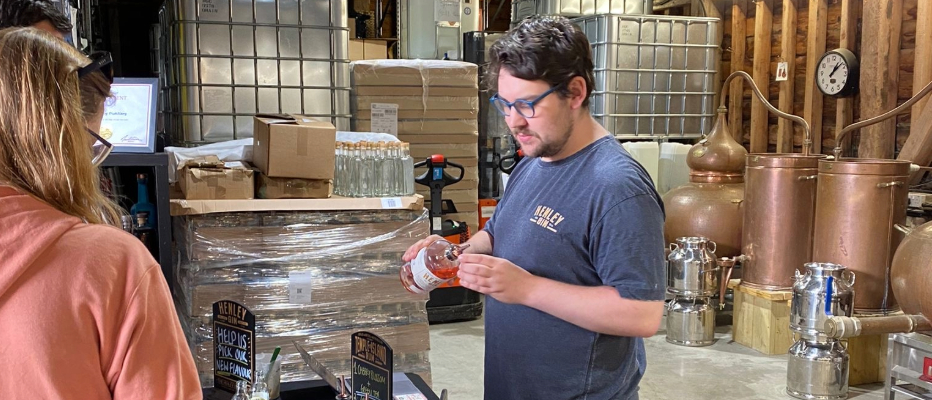Submission Deadline
28 February 2026
Judging
Date
24 & 25 March 2026
Winners Announcement
22 April 2026
28 February 2026
24 & 25 March 2026
22 April 2026

As someone who developed an interest in the alcohol industry since he was a teenager, Ben Carmichael began his career at the age of 15 at Otter Brewery. Since then, driven by a dedication to hone his craft and a deep passion for spirits, Carmichael has taken on the role of Head Distiller at The Henley Distillery, celebrated for its artisanal gins. With his wealth of experience and expertise, the London Spirits Competition had the pleasure of speaking with Carmichael. In this interview, he shares insights into his distilling career and his current responsibilities at The Henley Distillery.
It was during my time at Devon Distillery, where I got to be hands-on in the distilling and development process, that I really learned a lot about the art of distilling. From there, I moved on to become the Head Distiller at Cardiff Distillery, which was a huge step up that came with additional responsibilities such as manufacturing large industrial units, making products for hotel bars, and canned soft drinks. Here I was introduced to Jacob Wilson, the founder and master distiller of The Henley Distillery. He was looking for someone to take care of the daily responsibilities at his distillery so that he could focus on expanding the business. As I appreciated The Henley Distillery’s ethos and attention to detail, I was quick to take up the offer back in July 2023.
Also read: Top 10 Festive Gins to Try This Christmas Season
Working in a small-scale distillery, it’s a very new-day-new-challenge kind of scenario. So no two days have ever been the same. However, a typical day for me begins the evening prior, when I weigh out botanicals and fill our copper alembic pot stills with neutral spirits, or our base rum and water. That way, when I arrive at the distillery at 6:00 AM, I can turn on the stills, which are heated using gas flames. Our distillation process takes 10 to 12 hours to complete, during which I am constantly tasting the spirit for both quality and smoothness, cutting from heads to hearts and then hearts to tails purely based on taste. While the stills are running, I use that time to develop new products or review and refine our process documentation.

Image Title and Credits: Head Distiller Ben Carmichael
At The Henley Distillery, we take pride in the fact that all our gins are single-shot, which means that we do not need to add any additional alcohol post-distillation. Instead, we like to use purified water to cut down a batch from 82% ABV to 42% and just like our distillation process, we prefer to keep the blending process also slow, taking at least two weeks to complete a batch.
I think any distiller who is able to use their own personal skills to succeed in the distilling industry can have a successful career in the field. I consider analytical and diligent research skills to be my strengths, which I have continuously used to become a more successful distiller. One such occasion would be when I collaborated with Downton Distillery’s Hugh Anderson on James Gin's London Drizzle recipe. I still remember reading through multiple marine biology books to perfect the chemical composition of the gin and capture the flavour of oyster shells while keeping the drink vegetarian-friendly.
Also read: Top 5 Gin Brands That You Need To Try
I personally feel that a good distiller is someone who is also a very good decision-maker. Despite the numerous responsibilities they juggle and the challenges they face, they still need to have that headspace to be able to decide what will make the spirits better. This also means having the ability to be self-critical of their own work. It can be hard for a distiller to criticise their own production given the effort they put in. But a good distiller can easily rise above that, making improvements as and when needed.

Image Title and Credits: Ben Carmichael, The Henley Distillery
In any given industry, you will notice that the best salespeople are those who are passionate about what they are selling. The same goes for the distillery industry. That is why I think it is important for distillers to be involved in sales and marketing discussions, as they are the best people to explain why your product is special.
[[relatedPurchasesItems-63]]
I like to invite bartenders to the distillery so that they can see the manufacturing process for themselves. I feel that no matter how much I talk about the brand and our ethos, it can never be as effective as having firsthand experience of how much consideration goes into each step of handcrafting our gins. We have applied the same formula to promote our brand to consumers too through The Henley Gin Experience, in which they get to distill their own gins.
When I was running Gin Schools, I used to tell people that the number of gin distilleries had almost tripled since 2015. This is both a blessing and a curse because part of what has caused the boom in gin and, to some extent, all spirits is the diverse range of options available that attracted a wider variety of consumers. On the flip side, it also means that it can become challenging to stand out in the market.
Header image sourced from The Henley Distillery’s Instagram page
Related links
Behind the Glass: Colin Hampden-White's Spirit-Filled Life
Gin Trends for Bartenders in 2024-25: Insights from the 2024 London Spirits Competition
Show your spirits where it matters. Get your products tasted by top bartenders, buyers and experts at the London Competitions — enter now.